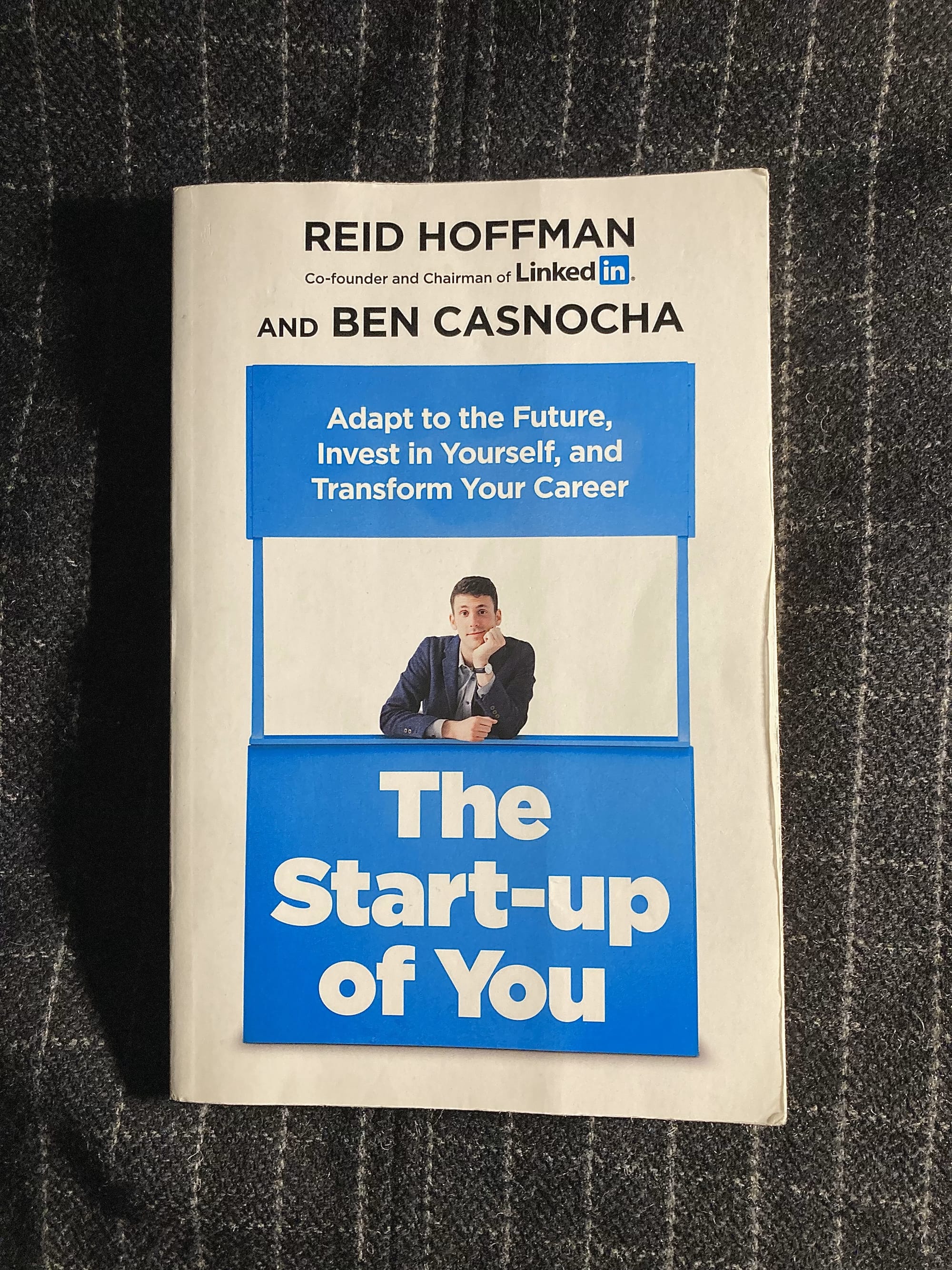The Start-up of You (Reid Hoffman & Ben Casnocha) - Book Note and Big Ideas

The Start-up of You is a book on how to not only survive but thrive in the modern and dynamic job market. The major premise of the book is that there are many things that the modern employee can adopt in their careers from the startups of Silicon Valley. The authors are Reid Hoffman, perhaps most famous as co-founder of Linkedin, and Ben Casnocha, a VC at Village Global and Reid's former chief of staff.
Today’s book notes look a little bit different from normal. Instead of the usual format, I am going to summarize the book in five big and important ideas.
The Five Big Ideas:
- Entrepreneurship is in our DNA
- Your network is your net worth
- Intelligent risk-taking is the way to achieve great results
- Develop your personal competitive advantage
- Cultivate strategic serendipity
Entrepreneurship is in our DNA
All human beings started as entrepreneurs, we foraged our own food and created our own tools. It is only in the later generations that most people are employed laborers. All humans share the genes for entrepreneurship and we can all tap into them if we need to. I think this is an important reframe for us all to realize that we are all capable of being entrepreneurs even though we from an early age are taught we will be employees. Equally important I think it is to remember that being entrepreneurial does not require you to start your own firm, there are many opportunities for entrepreneurs within larger firms and that skill set can make you hugely successful.
The modern job market is highly dynamic and things are changing rapidly. In such an environment the career strategies of previous generations that include climbing the corporate ladder don’t work. Today you need to be adaptable and never stop learning or you will fall behind. These skills are similar to those required by startups and entrepreneurs to succeed in early-stage ventures.
“All human beings are entrepreneurs. When we were in the caves, we were all self-employed... finding our food, feeding ourselves. That's where human history began. As civilization came, we suppressed it. We became "labor" because they stamped us, "You are labor." We forgot that we are entrepreneurs.” -Muhammad Yunus, Nobel Peace Prize winner and microfinance pioneer
“One of the key messages we hope you've taken away from this book is that you are changing, the people around you are changing, and the broader world is changing- so it's inevitable the playbook will evolve and adapt.”
“Whether you want to learn a new skill or simply be better at the job you were hired to do, it's now your job to train and invest in yourself”
Your network is your net worth
In today’s world, your peers and network are often more important than your boss as there is greater mobility between firms and former colleagues or people in your network might help you along the way. It is important to both have close connections and looser connections. Close connections are key as they can make referrals and assist you in other ways. Loose connections instead offer the ability to present opportunities through your network, they may keep you in mind when they see job opportunities or hear about interesting possibilities.
“Professional loyalty now flows "horizontally" to and from your network rather than "vertically" to your boss, as Dan Pink has noted”
“Diversity and breadth in your network encourages flexibility to pivot.”
“Strong connections optimize trust because there's likely overlap in belief systems and communication styles. Weak connections help find creative solutions by introducing new information and resources from other social circles “
Intelligent risk-taking is the way to achieve great results
We can’t go through life without encountering risk, it is a permanent part of life. The key is to take calculated risks at intelligent times. This will help you to generate and seize breakout opportunities as you encounter them. In terms of your career, this might mean taking a lower-paying job in the short-term for long-term learning, or joining a startup with more risk and upside instead of a larger established company. It is important to remember that there are no risk-free choices, indeed the risks are just different.
One way to take more intelligent risks is to look at what your risks are now versus in the future. When you are young you may not have kids and a mortgage and thus your financial risk may not be so high as later in life. The downside is not as bad and therefore you can often take bigger risks when you are younger as the risk/reward ratio is better.
“Just as financial advisors counsel young people to invest in stocks more than bonds, it's important to be especially aggressive accepting career risk when you are young.”
“The principles of Silicon Valley are the principles in this book. Take intelligent and bold risks to accomplish something great. Build a network of alliances to help you with intelligence, resources, and collective action. Pivot to a breakout opportunity.”
“Actions help you discover where you want to go and how to get there.”
“But risk isn't the enemy-it's a permanent part of life. In fact, being proactively intelligent about risk is a prerequisite for seizing those breakout opportunities we talked about in the last chapter. “
Develop your personal competitive advantage
Your personal competitive advantage is shaped by three factors: your assets, your aspirations/values, and the market realities. Your assets are what you have right now, there are soft assets (e.g. knowledge, professional connections, skills, etc.) and hard assets (e.g. cash, physical possessions, etc.). Aspirations refer to your goals and vision of the future. Finally, market realities refer to the fact there must be a demand for what you offer for it to be valuable.
To develop a competitive advantage it can often be useful to pick up complementary assets and leverage them together. One way to do this is to combine two different skills that are unusual together, an example of this is that Warren Buffett combines being a world-class investor with being a great public speaker or it could be combining a skill and connection that gives you an advantage. Another way to develop a competitive advantage is to pick an area with less competition. This can be a helpful tactic to help you succeed, it might be easier to carve out a niche where you have an advantage instead of competing with the general market.
“Usually, however, single assets in isolation don't have much value. A competitive edge emerges when you combine different skills, experiences, and connections.”
“The best direction has you pursuing worthy aspirations, using your assets, while navigating the market realities.”
“Whether you want to learn a new skill or simply be better at the job you were hired to do, it's now your job to train and invest in yourself”
Cultivate strategic serendipity
We can’t control when luck will find us, but we can increase the probability of it happening and make sure that we are ready when the opportunity strikes. This is what cultivating strategic serendipity means to me, increasing your surface area for luck to hit you. To do this you can make sure to be moving and be action-oriented, you can make efforts to meet interesting people and have interesting conversations. All of these activities will increase the odds of you finding a “lucky break”. Serendipity is a lot less likely to happen if you are sitting in your room scrolling Instagram than if you are out meeting interesting people and having insightful conversations.
If the first component of cultivating serendipity is to be moving and creating more chances for opportunity then the second key component is the ability to spot those opportunities. If it was easy to spot these opportunities everyone would be seizing them. To become better at spotting these opportunities follow your curiosity and develop domain knowledge. Often times this knowledge will allow you to see opportunities that may be hidden from others.
“Serendipity involves being alert to potential opportunity and acting on it.”
“By being in motion, you are spinning a web as wide and as tall as possible in order to catch any interesting opportunities that come your way “
“Finally, pushing interesting information out to your network increases your chances of serendipitous intelligence. Post an article, email a quote, forward along a job offer, and in other ways share small gifts to your network “
Conclusion
Find your entrepreneurial spirit and embrace it to have more success in your modern career. These 5 big ideas will help to guide you there:
- Entrepreneurship is in our DNA
- Your network is your net worth
- Intelligent risk-taking is the way to achieve great results
- Develop your personal competitive advantage
- Cultivate strategic serendipity
